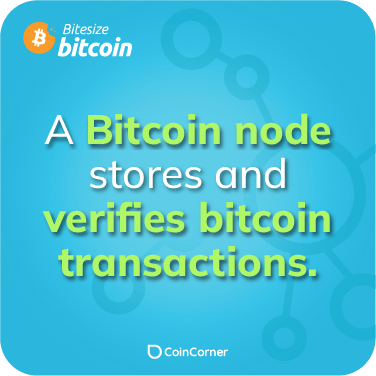What is a bitcoin node?

Bitcoin nodes are a crucial component of the Bitcoin network that stores and verifies Bitcoin transactions. Nodes play a pivotal role in ensuring the security, integrity, and decentralization of the network. Here's how a Bitcoin node functions in storing and verifying Bitcoin transactions:
1. Network Participation:
A Bitcoin node is a computer or server that participates in the Bitcoin network. It connects to other nodes through the internet to create a distributed peer-to-peer network.
2. Storage of the Blockchain:
The most fundamental role of a Bitcoin node is to maintain a complete copy of the Bitcoin blockchain. The blockchain is a public ledger that contains a record of all Bitcoin transactions since its inception. This ledger is composed of blocks, with each new block added approximately every ten minutes. Nodes continuously download, verify, and store these blocks.
3. Transaction Verification:
When a new Bitcoin transaction is broadcast to the network, nodes receive and verify it. Verification includes confirming that the transaction adheres to the Bitcoin protocol's rules, such as checking that the sender has sufficient funds and that the transaction is properly signed.
4. Consensus Mechanism:
Bitcoin nodes collectively form a consensus mechanism by ensuring that transactions and blocks adhere to the same set of rules. If a transaction or block violates the rules, nodes will reject it. This consensus mechanism is a fundamental component of Bitcoin's security and trustlessness.
5. Relay of Transactions:
Once a transaction is verified and deemed valid, nodes relay it to other nodes in the network. This process allows the transaction to propagate across the network, ensuring that every node is aware of it.
6. Block Validation:
Nodes also play a critical role in validating new blocks that are added to the blockchain. They verify that the transactions included in a block are valid and that the block adheres to the network's rules, such as proof of work requirements.
7. Incentives for Miners:
Miners, who are responsible for adding new blocks to the blockchain, are incentivized to follow the rules because nodes will reject invalid blocks. Miners must include valid transactions in their blocks to receive the block reward and transaction fees.
8. Support for Network Consensus:
By participating in the network, nodes help maintain the decentralization and integrity of the Bitcoin network. If a substantial number of nodes agree on the state of the network, it contributes to the overall consensus regarding Bitcoin's transaction history.
9. User Interfaces:
Many nodes offer user interfaces, which allow users to view the blockchain, explore transactions, and monitor network activity. They serve as tools for both developers and regular users to interact with the Bitcoin network.
Share this fact:





